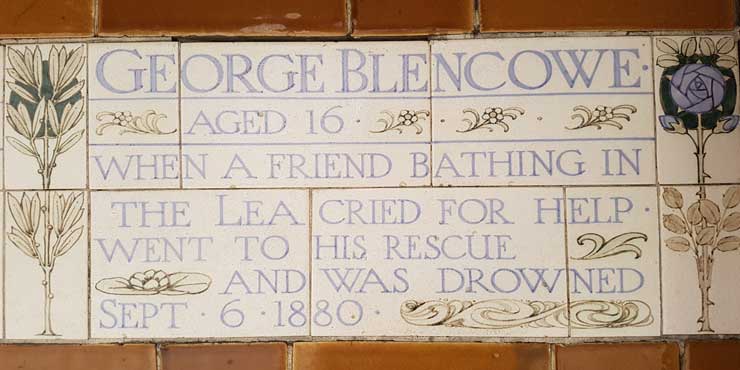
On September 6th 1880, sixteen-year-old George Blencowe (1864 - 180), gave his life in a valiant attempt to prevent a twelve-year-old boy from drowning in the River Lea, in East London.
His Postman's Park memorial plaque reads, "George Blencowe, Aged 16, When A Friend Bathing In The Lea Cried For Help, Went To His Rescue And Was Drowned. Sept 6 1880."
The Essex Newsman carried a brief report on the tragedy in its edition of the 11th September 1880:-
"A bathing accident, proving fatal to two youths, occurred on Monday evening near the old wooden bridge that spans the rive Lea near the Temple Mills.
A youth names William Sales was bathing at the place above mentioned. He had swum across the river to the Essex shore, and was returning to the Middlesex side, when he became exhausted.
George Blencowe, who was on the bank, saw the poor lad's condition and danger, and plunged into the water to save him; but the drowning boy clutched at his legs, and in the struggle pulled him down under the water, and both unfortunately were drowned.
The bodies were recovered and removed to Hackney mortuary to await an inquest."
The inquest had, in fact, been held on Wednesday 8th August 1880 and, The Evening Standard had published a detailed report on the proceedings on Thursday 9th August 1880:-
"Mr. George Collier, Deputy Coroner for East Middlesex, held inquests yesterday at the King's Head Tavern, Hackney, on the bodies of Walter Sale, aged twelve years and George Blencowe, aged sixteen, who met with their deaths in the River Lea on Monday afternoon.
John Sale, of 96, St. Anne's-road, Limehouse, a greengrocer, identified the body in the mortuary as that of his son.
George Blencowe, fruiterer, of 3, Maryland-road, Stratford, identified the other body as that of his son.
A youth named Stephen Webb deposed that he went to the River Lea with Sale on Monday, and when they reached a stream known as the Back River Sale said he would go in, as he could swim, and Witness held his clothes.
The deceased reached the middle of the stream, but was unable to return, and cried for help.
Blencowe heard the scream, and, slipping off his coat and boots, swam to his assistance.
Witness saw them struggling in the water and finally sink.
Stephen Jones, of 31, Beddingfield-place, Stratford New Town, a hammerman, stated that he heard screams,, as he thought, from the Back River.
He was then on the Walthamstow side of the Lea.
He divested himself of his clothing, swam across the river, ran over the Marshes and thus reached the spot, where he was told by the bystanders that two Lads had gone down.
Witness swam to the spot indicated, dived, and felt both bodies. He was able to "Lock-up" in his legs the boy Sale and take him to the bank.
He then returned for the other body, but in the meantime a man entered the water, and when Witness reached the spot he dived again and found the man was standing on the boy's body.
The latter tried to take hold of him (Witness), and fearing he would do so, and feeling much exhausted, Witness returned to the shore, and the body was ultimately recovered by aid of the drags.
In answer to a Juryman, Witness said the man was intoxicated.
The water was not quite six feet deep.
There were several men on the banks at the time, but they said they could not swim.
Evidence was given that a medical man was promptly on the spot, but found both lives extinct.
The Jury returned a verdict of "Accidental death" in both cases.
At the request of the Jury, Jones was re-called.
The Coroner said the Jury could not speak too highly of the courage of the poor youth Blencowe for his heroic, though unsuccessful, attempt to save the life of Sale at the risk of his own; and he (Jones) had acted in a most praiseworthy manner in exposing himself to a second risk.
He (the Coroner) understood that this was the third body Jones had either saved or attempted to save, and, in addition to allowing him with great pleasure that remuneration he was entitled to receive, he should take steps to ensure that his heroic conduct was brought before the Royal Humane Society.
The Jury at once opened a subscription for Jones, who said he considered it his duty to save a life if he could do so."